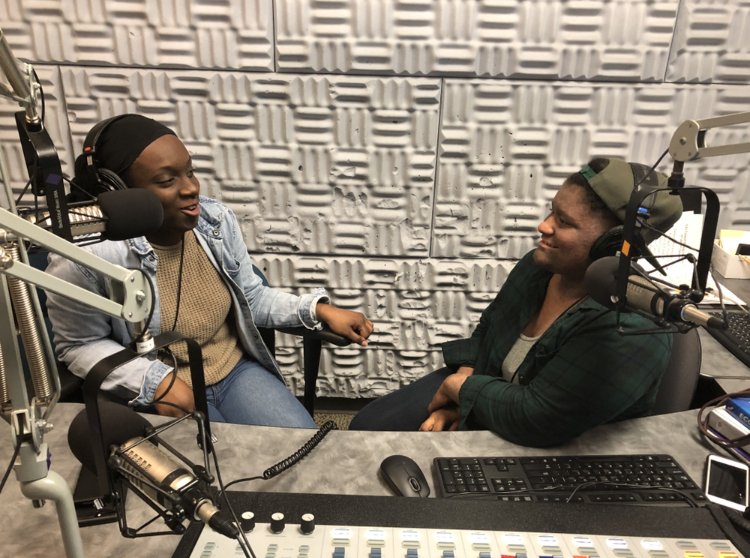This story was produced as part of KQED’s Youth Takeover week.
Two Bay Area Teens on Figuring Out Gender Identity — and High School — Together

Sam Mann and Ragan Foster, two seniors at El Cerrito High School, are having a casual conversation about “manspreading.”
Sam, who identifies as gender nonbinary and prefers the pronouns “they” and “them,” weighs in: “What is perceived as manspreading should be changed, because it’s not only men that do that. My mom hates it when I manspread [but] it’s natural for me. Do you feel comfortable when you manspread?”
“Ninety percent of the time when I’m sitting down, I’m manspreading,” Ragan responds. “And then people are like, ‘Ragan, you have on a certain type of clothing, you can’t have your leg like that.’ I’m like, dude it’s fine … chill.’ ”
Sam started feeling disconnected from their biological gender in elementary school. They first heard the words “nonbinary” in a YouTube video, and when they Googled the term, the results were an epiphany for them.
“I actually exited out of that video,” Sam says. “I didn’t finish it and I typed in ‘nonbinary.’ I was like, I wonder what that means. It brought tears to my eyes because I thought, that describes me so much. … There’s more people like me. This is amazing.”
Ragan, who is cisgender, meaning she identifies with her birth sex, has a condition called polycystic ovary syndrome, or PCOS, which boosts her male hormone levels and has given her more typically masculine qualities like facial hair, a deeper voice and muscular arms.
“I don’t know if you’ve seen “What’s Love Got to Do With It,” the movie with Angela Bassett, like how muscular her arms were,” she says. “I’ve had those type of arms since I was a little kid.”
Ragan says other students at school have approached her about rumors they’ve heard that she is transgender. Sam talks about receiving similarly insensitive remarks.
“I, for one, feel like it brought me closer to Sam, because it wasn’t the same things, but we bonded over similar situations where people would tell us how they perceive us and our gender, or how we sound … and how we look,” Ragan says.
Some of Sam and Ragan’s teachers are incorporating nonbinary pronouns into their foreign-language curriculum, but both students say there’s still a lot of progress that needs to be made at school, like designating more bathrooms gender-neutral. But Sam says they are glad to live in a state like California that is embracing gender expansiveness much more than in other places.
Sam talks about their reaction after finding out about California’s new law making nonbinary a legal gender:
“The news app on my phone … reminded me, saying that like, oh, California now validates nonbinary as an actual gender, and I was like, that’s great,” they said. “And then I think, like, either last year or a few months after that, they said now California IDs [can] say nonbinary, and I was really excited!”
Sam and Ragan were both pretty timid when they started high school, but, as they near graduation, they feel like they’ve found their own voices.
“I was shy ’cause I felt like, if I did something out of pocket, I’d be viewed as weird,” Sam says. “Now I’m like, if they view me as weird, I don’t really care. Weird is the new normal. I was quiet, but now I’m loud. I want my voice heard.”
Sam Mann and Ragan Foster are both seniors at El Cerrito High School.
